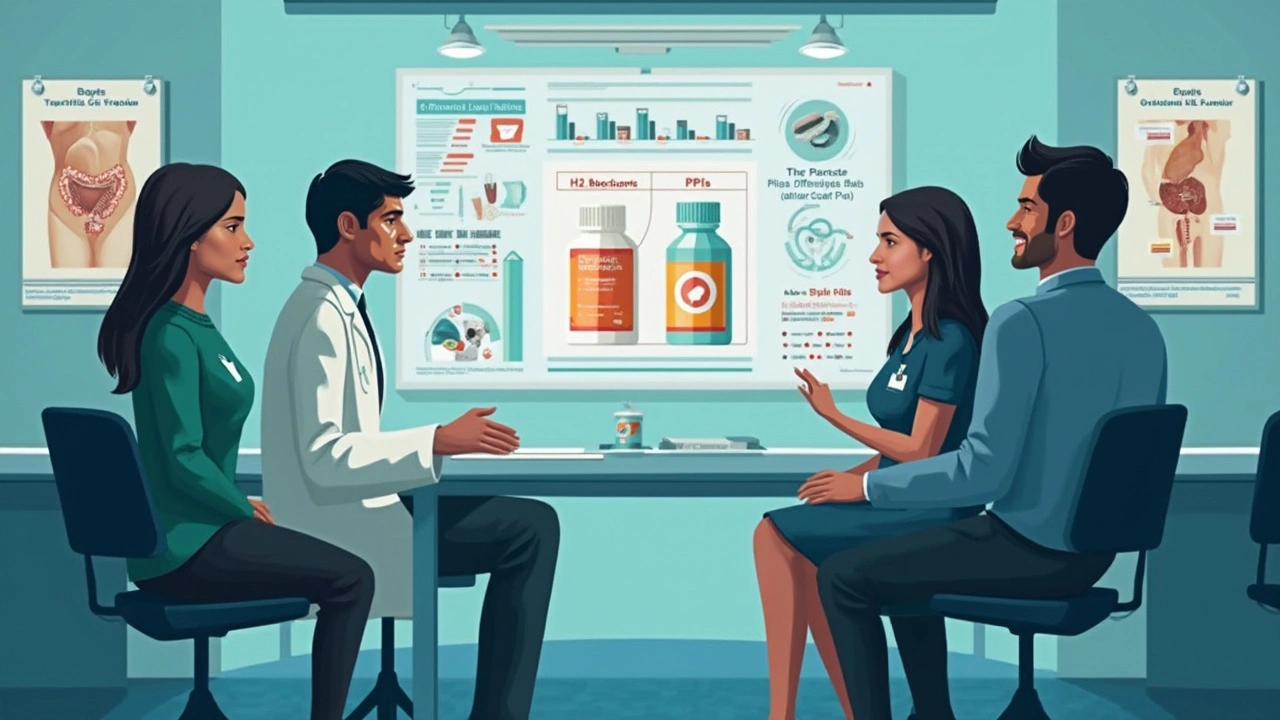H2 Blockers vs PPIs: Find the Best Heartburn Relief for You

Woke up in the middle of the night feeling like your chest is about to burst into flames? You’re not alone. Heartburn isn’t just annoying — it can hijack your mornings and wreck your sleep. The pharmacy shelves are stacked with so many bottles promising relief that it’s almost easier to just chug the milk and hope for the best. But knowing the difference between H2 blockers and PPIs can mean you actually win the fight instead of just slowing it down.
What Are H2 Blockers, and Who Should Use Them?
Back in the ’70s, when shag carpets and lava lamps were all the rage, the first H2 blocker showed up on pharmacy shelves. Cimetidine was the original, but you’re way more likely to run into famotidine (Pepcid) and, until a few years back, ranitidine (Zantac). These smart little molecules block the histamine-2 receptor sitting on your stomach’s acid-pumping cells. Basically, they keep your gut from pouring acid into your esophagus every time you eat garlic bread or pizza. They don’t zap every acid cell into submission, but they turn the dial down on your heartburn.
Let’s get real: if you only get heartburn when you eat a giant meal, pound spicy food, or crash on the couch right after dinner, H2 blockers might be your sweet spot. They aren’t built for daily, around-the-clock suppression, but they work fast (sometimes in less than an hour), and a single pill can help you sleep through the night without that burning feeling.
Famotidine is hands down the top choice among H2s since ranitidine was yanked in 2020 over those pesky NDMA concerns. Famotidine is not only effective but also carries a lower risk of drug interactions. Most people find 20–40 mg before a meal keeps things calm. Ranitidine, if you can find it outside the US or among old generics, worked just as fast but runs a higher risk due to contamination with NDMA. You’ll find nizatidine, another milder cousin, in small pharmacies, but it’s rarely the first pick.
Need something you can pop now and then, without dramatically shaking up your gut bacteria or risking long-term side effects? H2 blockers got you covered. They’re also less likely to leave you low on magnesium or vitamin B12 compared to their PPI cousins after months of daily use. People with occasional heartburn, night-time acid spiking, or folks who only need acid suppression for a few days (say, after a crazy night out) reach for these.
Some folks notice their bodies get used to H2 blockers if they use them every day — doctors call this “tachyphylaxis.” Basically, if you take them non-stop, they start letting more acid sneak through. That’s why H2s are awesome for on-demand use but lose some magic for chronic GERD.
If you’re popping NSAIDs (like ibuprofen) and worried about ulcer prevention, famotidine is often safer than cimetidine, which messes with how your liver handles other drugs. Quick takeaway: H2s are a brilliant pick for people looking for symptom relief a few times a week or who need a short-term solution that won’t shake up their system too much.
PPIs: The Heavy Hitters of Heartburn—But Not for Everyone
Seeing commercials for Nexium, Prilosec, or Protonix everywhere? These are proton pump inhibitors (PPIs), and they’re the muscle behind long-term heartburn control. They take acid suppression to a level no H2 blocker can touch, by turning off the main acid pumps in the stomach lining. Instead of just dimming the light, PPIs practically unplug it.
Here’s where they shine: Chronic, daily heartburn. Uncontrolled GERD that laughs at over-the-counter meds. Patients healing nasty stomach ulcers or helping clear out H. pylori infections. PPIs need a few days to reach their full power, so they’re not your “Friday night pizza rescue.” But after about 3–4 days of daily use, they drop acid levels dramatically. This helps heal the esophagus lining, slash ulcer risk, and quiet acid so well that some people forget they ever had reflux.
But (and there’s always a but), you pay for this power with a higher side effect risk. Common pounding paths: PPIs can cause low magnesium, increase certain infection risks, mess with how your gut absorbs calcium and B12, and even raise the chances of kidney issues when used for years. They interact with more drugs—like the blood thinner clopidogrel—than most expect, so if you take other daily meds, mention it to your doc.
Rebound acid is another beast: abruptly quitting a PPI after months can actually trigger worse heartburn for a couple of weeks. That’s why anyone considering stopping PPIs should talk to a professional about tapering the dose or switching to an H2 blocker first for a smoother landing.
People with Barrett’s esophagus, severe esophagitis, or major GI bleeding history often don’t have a choice: PPIs save lives here. But if your heartburn is rare or you only get it when you go heavy on tacos, PPIs may be overkill.
Interestingly, in a British study published in 2023, around 30% of people taking daily PPIs had never tried an H2 blocker—highlighting that many might use these powerful drugs without seeing if a less aggressive med would do the job.

Comparing H2 Blockers and PPIs: Pros, Cons, and Key Stats
So which class fits you best? If you need quick, reliable short-term relief without making your stomach a sterile wasteland, H2 blockers still hold their ground. If you’re wrestling with daily pain, waking up to acid in your throat, or if your doctor says you need full-on acid suppression, PPIs take the win. But what about side effects, speed, and how they fit into your life?
| H2 Blockers (Famotidine, Ranitidine) | PPIs (Omeprazole, Nexium, Pantoprazole) | |
|---|---|---|
| Onset Time | 30–60 minutes | 24–48 hours for peak effect |
| Best For | Occasional mild/moderate reflux, night-time heartburn | Frequent/severe reflux, acid suppression, ulcer healing |
| How Long To Take | Short spurts, on-demand, up to 2 weeks | Daily use (can be long-term for some, but reassess regularly) |
| Main Side Effects | Mild headache, rare liver/kidney impact | Low magnesium, infection risk, kidney effects, bone loss on long-term use |
| Rebound Acid? | Minimal | Often occurs if stopped suddenly after chronic use |
| Cost | OTC Cheap | Usually affordable OTC but varies by brand |
| Interaction With Other Drugs | Cimetidine: High; Famotidine: Low | Moderate with several drugs (clopidogrel, antifungals, anti-HIV meds) |
One important note: Since ranitidine was taken off the market in the USA due to NDMA, most doctors just don’t recommend it anymore. If you’re living somewhere it’s still sold, the risks might outweigh the benefits — always check your country’s guidelines.
Still not finding relief or worried about side effects? You’re not out of luck. Plenty turn to an alternative to Nexium or try newer options, like alginate-based products that float like a raft on top of your stomach contents. If prescription meds are causing trouble, talking to your doc about alternative dosing schedules or non-drug tips (like raising your bed head or fixing evening meal times) pays off way more than most people expect.
Smart Tips for Heartburn Control—Beyond the Label
Medications help, but let’s not kid ourselves: lifestyle tuning can sometimes work better than any pill. About 43% of chronic heartburn sufferers found major relief by just tightening up their late-night snacking habits, according to a 2022 multicenter survey. Smaller meals in the evening, sticking to the two-hour rule before bed, and avoiding booze or chocolate near sleep can make your pill work twice as well—or help you ditch it sooner.
Timing is everything. With H2 blockers, take it 30 minutes before your trigger meal or bedtime. Don’t double up if you miss a dose; just wait until the next trigger point. For PPIs, mornings on an empty stomach work best. If you shift schedules or skip days, you may notice more rebound. That’s your reminder to reset the timing, not stack the dose.
Don’t forget about drug interactions. Both classes are better taken apart from antacids (like Tums), since those can block absorption. Separate them by at least an hour. Also, if you’re over 60 or taking meds for blood pressure, diabetes, or cholesterol, double-check with a pharmacist — a simple check could save you from a nasty side effect.
Too many people stick with a med that isn’t working or suffer side effects in silence. Don’t tough it out. If your chosen med takes over a week and you’re still miserable, it’s time to reevaluate — your doctor might suggest a different dose, a combo approach, or a full medication redo.
Kids and older folks need special mention: heartburn in little ones (especially babies) or people over 75 comes with extra challenges. Pediatric dosing is different, and adults might be more prone to low calcium or infection risks. For kids, never give a med without a pediatrician’s okay. For seniors, lower doses or extra bloodwork checks should be routine.
Last but not least, don’t get lost in the supplement jungle. While ginger chews, chamomile tea, or licorice have fans, most lack solid proof. Focusing on real fixes—keeping a healthy weight, not lighting up cigarettes, or elevating the bed head—beats any herbal hack. And yep, if your throat feels raw, you get recurrent vomiting, or you lose weight without trying, those are red flags. Get a doc’s opinion, since sometimes what seems like plain reflux can be something more serious hiding underneath.
- May 22 2025
- Jasper Thorneville
- Permalink
- heartburn H2 blockers PPIs famotidine alternatives to Nexium
- 0 Comments
Written by Jasper Thorneville
View all posts by: Jasper Thorneville